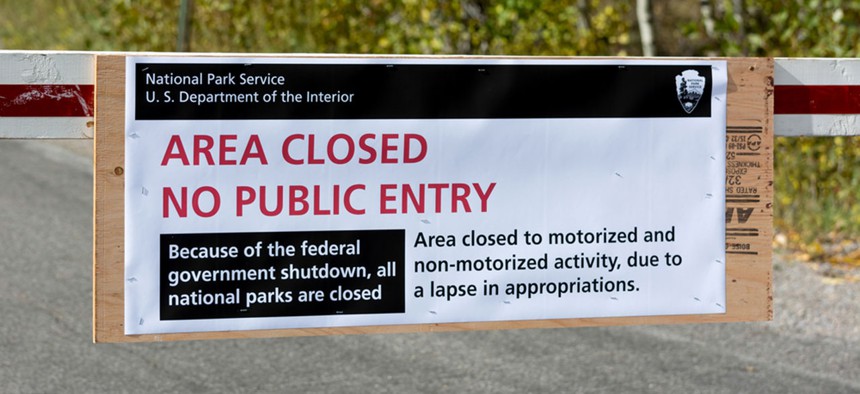
A sign at Grand Tetons National Park informs visitors in 2013. Philip Bird LRPS CPAGB/Shutterstock.com file photo
With a Shutdown Approaching, Dems Promote National Parks
A bill marking National Park Service centennial comes weeks before the parks could be shuttered.
As Congress hurtles toward the government funding deadline with no solution in sight, House Democrats are drawing more attention to the ultimate shutdown symbol—national parks.
Rep. Raul Grijalva is set to introduce Obama administration-backed legislation on Friday intended to mark the 100th anniversary of the National Park Service next year and boost spending across the system.
“This bill will give our great public-lands system the salute it deserves and make sure the National Park Service has what it needs to continue preserving the most beautiful parts of the United States into the future,” said Grijalva, the ranking member of the House Natural Resources Committee.
But the timing of the bill’s introduction—less than two weeks before governing funding is set to expire—also serves to highlight the popularity of the NPS before their gates could be shuttered, if Congress shuts down the government as part of a dispute over Planned Parenthood funding. Conservatives have said they won’t accept a spending bill that doesn’t cut funding for the controversial group, while Democrats and the White House said they wouldn’t support the cuts.
Leadership in both chambers say they’re determined to avoid a shutdown but don’t yet have a plan to do so. And that could mean that for the second time in three years, the nation’s parks could shut their gates.
When a standoff between Republicans and the White House over health care spending shut down the government for 16 days in October 2013, shuttered national parks became one of the most potent symbols and political hot potatoes. Weddings on national land had to be canceled, vacations were postponed, and veterans were turned away from the World War II Memorial in Washington.
All told, the NPS estimated that the economic hit of the parks’ closure was more than $414 million, but Republicans also took a beating politically.
Western Republicans have sought to blunt the impact of another shutdown with a bill that would keep parks open, coupled with a separate bill that would repay states for losses during a shutdown. (Six states shelled out around $3.6 million to reopen their parks as tourists were turned away from the gates.) The latter bill passed out of the Senate Energy and Commerce Committee, but the “Public Access to Public Land Guarantee Act” has not moved in this Congress.
Speaking to reporters earlier this week, Interior Secretary Sally Jewell said her agency was already getting ready for funding to dry up again, expressing frustration that it could happen for the second time in her term and so close to the 100th anniversary.
“We profoundly hope there is no government shutdown. That is the basis on which we’re operating,” said Jewell at an event hosted by The Christian Science Monitor. But, she added, “We have to do shutdown planning. Unfortunately, we’re getting pretty good at that.”
Grijalva’s bill, which has five Democratic co-sponsors, would establish a special fund, matched by private donations, to fund infrastructure improvements, while also requiring an appropriation of $300 million to the NPS construction account for fiscal years 2016 to 2018. The bill would also establish a $100 million annual fund for land management, boost spending on educational programs, and lift an appropriations cap for an NPS volunteer program.
The White House, which proposed the centennial program, said it would “ensure that our national parks, facilities, and educational programs are of the highest quality.”
It would also help to correct a budget shortfall that has plagued the NPS: According to the National Parks Conservation Association, national parks are short by more than a half-billion dollars each year, forcing cutbacks on park rangers, visiting hours, and maintenance.
“So many Americans place enormous value on the ability to visit our national parks, and our nation points to them with pride, which is why a substantial federal investment is essential to maintain and preserve them,” said Rep. Niki Tsongas, a co-sponsor of the bill. “Adequately funding our national parks, especially during the centennial, is a smart, long-term investment to preserve sites and involve and excite a new generation.”
(Image via Philip Bird LRPS CPAGB / Shutterstock.com )






